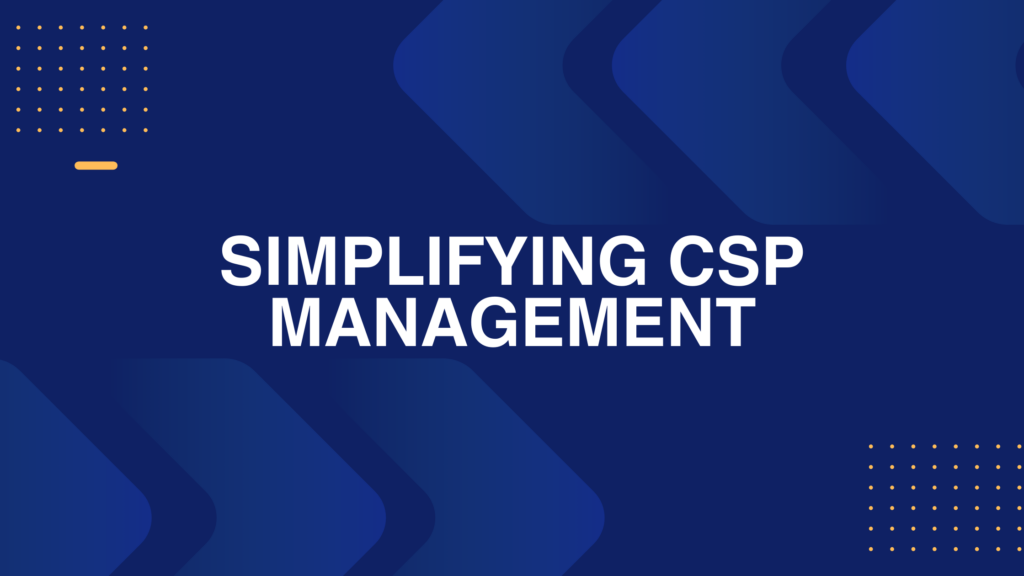Microsoft Cloud Solution Providers (CSPs) are at the forefront of delivering innovative solutions while navigating the complexities of compliance, security, and data-driven decision-making. Moreover, the shift towards customer-centric models has underscored the importance of self-service capabilities. This detailed exploration offers actionable insights into ensuring CSP compliance and security, harnessing analytics for strategic advantage, and enhancing customer engagement through self-service portals.
Fortifying CSP Compliance and Security
Achieving Robust Compliance and Security in CSP Subscription Management
In the digital age, where data breaches are increasingly common, CSPs must prioritize robust security measures and compliance protocols to protect sensitive customer data and maintain trust. Implementing a multi-layered security strategy that encompasses the latest in encryption technology, regular security audits and stringent access controls is non-negotiable. CSPs should adhere to global standards such as GDPR for data protection and ISO/IEC 27001 for information security management.
- Regular Compliance Training
Ensuring that your team is well-versed in the latest compliance requirements and security best practices is crucial. Regular training sessions can help mitigate risks associated with human error. - Advanced Threat Detection
Utilize advanced threat detection tools to monitor your systems for any unusual activity, ensuring that potential breaches are identified and mitigated swiftly.
Data Protection Best Practices for CSP Partners
Data protection extends beyond mere compliance; it’s about safeguarding your business’s reputation and your customers’ trust. Implementing end-to-end encryption, both for data at rest and in transit, ensures that customer information remains secure. Furthermore, establishing a comprehensive data governance framework that outlines data handling, storage, and sharing policies is essential for maintaining data integrity and privacy.
- Robust Backup and Recovery
Develop and maintain a robust data backup and recovery plan to ensure business continuity in the event of data loss or a cyberattack. - Customer Data Management
Provide customers with clear information on how their data is used and stored, including options for data portability and deletion, aligning with privacy regulations.
Harnessing CSP Analytics and Reporting
Utilizing Analytics for Informed CSP Management
In today’s data-driven world, leveraging analytics can provide CSPs with a competitive edge. Analytics tools can offer insights into customer usage patterns, helping to tailor services to meet specific needs and identify opportunities for upselling or cross-selling. Moreover, analyzing operational data can highlight inefficiencies in service delivery, guiding process improvements.
- Predictive Analytics
Employ predictive analytics to forecast future trends in customer behavior or service demand, allowing for proactive adjustments to your service offerings. - Custom Dashboards
Develop custom dashboards that provide real-time insights into key performance indicators (KPIs), enabling quick decision-making and strategic planning.
Innovating with Custom Reporting Tools
Custom reporting tools empower CSPs with the ability to generate tailored reports that offer deep insights into subscription metrics, billing information, and customer lifecycle management. These tools can facilitate:
- Segmented Customer Analysis
Segment customers based on usage, spending, or service preferences to identify patterns and tailor marketing strategies accordingly. - Financial Health Monitoring
Keep a close eye on the financial health of your CSP business by tracking revenue growth, churn rates, and profitability metrics.
Empowering Customers Through Self-Service Portals
Maximizing Customer Satisfaction with Self-Service Options
The modern customer values autonomy and instant access to services. A well-designed self-service portal can significantly enhance customer satisfaction by allowing users to manage their subscriptions, access billing information, and resolve common issues independently.
- User-Centric Design
Focus on creating a user-friendly interface that simplifies navigation and transaction processes for customers. - Feedback Loops
Incorporate mechanisms for collecting customer feedback on the self-service experience, enabling continuous improvement.
Building Effective Self-Service Portals for Enhanced CSP Management
Developing an effective self-service portal involves more than just technical implementation; it requires a strategic approach to content, functionality, and user engagement.
- Comprehensive Knowledge Base
Include an extensive knowledge base that provides answers to frequently asked questions and guides on common issues. - Personalization:
Offer personalized experiences based on the customer’s history and preferences, enhancing the relevance and effectiveness of the self-service portal.
Conclusion
For Microsoft CSPs, mastering the intricacies of compliance, security, analytics, and customer self-service is essential for thriving in the competitive cloud marketplace. By adopting a strategic approach to these areas, CSPs can not only enhance operational efficiency and customer satisfaction but also pave the way for sustained growth and success. As the cloud ecosystem continues to evolve, staying ahead in these critical areas will ensure CSPs remain competitive and responsive to the changing needs of their customers. TotalOne stands ready to partner with businesses aiming to leverage the full potential of Microsoft CSP, guiding them toward operational excellence and sustained growth in the cloud domain. If you need help, kindly contact us today.



